# Unit 4: Measurement and Geometry
## Angle Theorems
1. ```Transversal Parallel Line Theorems``` (TPT)
a. Alternate Angles are Equal ```(Z-Pattern)```
b. Corresponding Angles Equal ```(F-Pattern)```
c. Interior Angles add up to 180 ```(C-Pattern)```
- 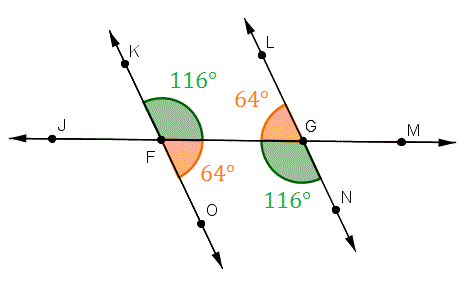 2. ```Supplementary Angle Triangle``` (SAT)
- When two angles add up to 180 degrees
-
2. ```Supplementary Angle Triangle``` (SAT)
- When two angles add up to 180 degrees
-  3. ```Opposite Angle Theorem (OAT)``` (OAT)
- Two lines intersect, two angles form opposite. They have equal measures
-
3. ```Opposite Angle Theorem (OAT)``` (OAT)
- Two lines intersect, two angles form opposite. They have equal measures
-  4. ```Complementary Angle Theorem``` (CAT)
- The sum of two angles that add up to 90 degrees
-
4. ```Complementary Angle Theorem``` (CAT)
- The sum of two angles that add up to 90 degrees
-  5. ```Angle Sum of a Triangle Theorem``` (ASTT)
- The sum of the three interior angles of any triangle is 180 degrees
-
5. ```Angle Sum of a Triangle Theorem``` (ASTT)
- The sum of the three interior angles of any triangle is 180 degrees
-  6. ```Exterior Angle Theorem``` (EAT)
- The measure of an exterior angle is equal to the sum of the measures of the opposite interior angles
-
6. ```Exterior Angle Theorem``` (EAT)
- The measure of an exterior angle is equal to the sum of the measures of the opposite interior angles
- 7. ``` Isosceles Triangle Theorem``` (ITT)
- The base angles in any isosceles triangle are equal
-
7. ``` Isosceles Triangle Theorem``` (ITT)
- The base angles in any isosceles triangle are equal
- 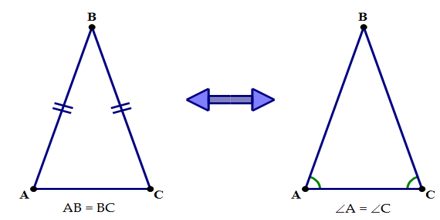 8. ```Sum of The Interior Angle of a Polygon```
- The sum of the interioir angles of any polygon is ```180(n-2)``` or ```180n - 360```, where ```n``` is the number of sides of the polygon
-
8. ```Sum of The Interior Angle of a Polygon```
- The sum of the interioir angles of any polygon is ```180(n-2)``` or ```180n - 360```, where ```n``` is the number of sides of the polygon
-  9. ```Exterior Angles of a Convex Polygon```
- The sum of the exterior angle of any convex polygon is always ```360 degrees```
-
9. ```Exterior Angles of a Convex Polygon```
- The sum of the exterior angle of any convex polygon is always ```360 degrees```
- 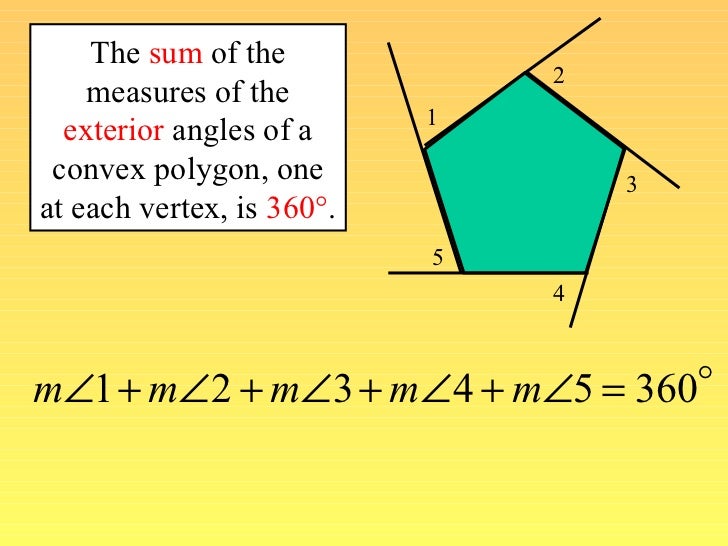 ## Properties of Quadrilaterals
- Determine the shape using the properties of it
|Figure|Properties|
|:-----|:---------|
|Scalene Triangle|no sides equal|Length of line segment|
|Isosceles Triangle| two sides equal|Length of line segment|
|Equilateral Triangle|All sides equal|Length of line segment|
|Right Angle Triangle|Two sides are perpendicular to each other|
|Parallelogram|Opposite sides are parallel and have equal length. Additionally, the diagonals bisect each other|
|Rectangle|Adjacent sides are perpendicular to each other. Furthermore, the diagonals bisect each other and are equal in length|
|Square|All sides are equal in length. The adjacent sides and diagonals are perpendicular. The adjacent sides are equal in length, so as the diagonals|
|Rhombus|Opposite sides are parallel and all sides are equal to each other, the diagonals are perpendicular|
|Trapezoid|There is one pair of opposite sides and they are parallel and unequal in length|
|Kite|The diagonals are perpendicular|
## 2D Geometry Equations
|Shape|Formula|Picture|
|:----|:------|:------|
|Rectangle|```Area```: $`lw`$
## Properties of Quadrilaterals
- Determine the shape using the properties of it
|Figure|Properties|
|:-----|:---------|
|Scalene Triangle|no sides equal|Length of line segment|
|Isosceles Triangle| two sides equal|Length of line segment|
|Equilateral Triangle|All sides equal|Length of line segment|
|Right Angle Triangle|Two sides are perpendicular to each other|
|Parallelogram|Opposite sides are parallel and have equal length. Additionally, the diagonals bisect each other|
|Rectangle|Adjacent sides are perpendicular to each other. Furthermore, the diagonals bisect each other and are equal in length|
|Square|All sides are equal in length. The adjacent sides and diagonals are perpendicular. The adjacent sides are equal in length, so as the diagonals|
|Rhombus|Opposite sides are parallel and all sides are equal to each other, the diagonals are perpendicular|
|Trapezoid|There is one pair of opposite sides and they are parallel and unequal in length|
|Kite|The diagonals are perpendicular|
## 2D Geometry Equations
|Shape|Formula|Picture|
|:----|:------|:------|
|Rectangle|```Area```: $`lw`$
```Perimeter```: $`2(l+w)`$| |
|Triangle|```Area```: $`\frac{bh}{2}`$
|
|Triangle|```Area```: $`\frac{bh}{2}`$
```Perimeter```: $`a+b+c`$| |
|Circle|```Area```: $`πr^2`$
|
|Circle|```Area```: $`πr^2`$
```Circumference```: $`2πr`$ or $`πd`$| |
|Trapezoid|```Area```: $` \frac{(a+b)h}{2}`$
|
|Trapezoid|```Area```: $` \frac{(a+b)h}{2}`$
```Perimeter```: $`a+b+c+d`$| |
## 3D Geometry Equations
|3D Object|Formula|Picture|
|:----|:------|:------|
|Rectangular Prism|```Volume```: $`lwh`$
|
## 3D Geometry Equations
|3D Object|Formula|Picture|
|:----|:------|:------|
|Rectangular Prism|```Volume```: $`lwh`$
```SA```: $`2(lw+lh+wh)`$| |
|Square Based Pyramid|```Volume```: $`\frac{1}{3} b^2 h`$
|
|Square Based Pyramid|```Volume```: $`\frac{1}{3} b^2 h`$
```SA```: $`2bs+b^2`$| |
|Sphere|```Volume```: $`\frac{4}{3} πr^3`$
|
|Sphere|```Volume```: $`\frac{4}{3} πr^3`$
```SA```: $`4πr^2`$| |
|Cone|```Volume```: $` \frac{1}{3} πr^2 h`$
|
|Cone|```Volume```: $` \frac{1}{3} πr^2 h`$
```SA```: $`πrs+πr^2`$| |
|Cylinder|```Volume```: $`πr^2h`$
|
|Cylinder|```Volume```: $`πr^2h`$
```SA```: $`2πr^2+2πh`$| |
|Triangular Prism|```Volume```: $`ah+bh+ch+bl`$
|
|Triangular Prism|```Volume```: $`ah+bh+ch+bl`$
```SA```: $` \frac{1}{2} blh`$| |
## Optimization (For Maximimizing Area/Volume, or Minimizing Perimeter/Surface Area)
### 2D Objects
|Shape|Maximum Area|Minimum Perimeter|
|:----|:-----------|:----------------|
|4-sided rectangle|A rectangle must be a square to maximaze the area for a given perimeter. The length is equal to the width
|
## Optimization (For Maximimizing Area/Volume, or Minimizing Perimeter/Surface Area)
### 2D Objects
|Shape|Maximum Area|Minimum Perimeter|
|:----|:-----------|:----------------|
|4-sided rectangle|A rectangle must be a square to maximaze the area for a given perimeter. The length is equal to the width
$`A = lw`$
$`A_{max} = (w)(w)`$
$`A_{max} = w^2`$|A rectangle must be a square to minimaze the perimeter for a given area. The length is equal to the width.
$`P = 2(l+w)`$
$`P_{min} = 2(w + w)`$
$`P_{min} = 2(2w)`$
$`P_{min} = 4w`$|
|3-sided rectangle|$`l = 2w`$
$`A = lw`$
$`A_{max} = 2w(w)`$
$`A_{max} = 2w^2`$|$`l = 2w`$
$`P = l+2w`$
$`P_{min} = 2w+2w`$
$`P_{min} = 4w`$|
### 3D Objects
|3D Object|Maximum Volumne|Minimum Surface Area|
|:--------|:--------------|:-------------------|
|Cylinder(closed-top)|The cylinder must be similar to a cube where $`h = 2r`$
$`V = πr^2h`$
$`V_{max} = πr^2(2r)`$
$`V_{max} = 2πr^3`$|The cylinder must be similar to a cube where $`h = 2r`$
$`SA = 2πr^2+2πrh`$
$`SA_{min} = 2πr^2+2πr(2r)`$
$`SA_{min} = 2πr^2+4πr^2`$
$`SA_{min} = 6πr^2`$|
|Rectangular Prism(closed-top)|The prism must be a cube,
where $`l = w = h`$
$`V = lwh`$
$`V_{max} = (w)(w)(w)`$
$`V_{max} = w^3`$|The prism must be a cube,
where $`l = w = h`$
$`SA = 2lh+2lw+2wh`$
$`SA_{min} = 2w^2+2w^2+2w^2`$
$`SA_{min} = 6w^2`$|
|Cylinder(open-top)|$`h = r`$
$`V = πr^2h`$
$`V_{max} = πr^2(r)`$
$`V_{max} = πr^3`$|$`h = r`$
$`SA = πr^2+2πrh`$
$`SA_{min} = πr^2+2πr(r)`$
$`SA_{min} = πr^2+2πr^2`$
$`SA_{min} = 3πr^2`$|
|Square-Based Rectangular Prism(open-top)|$`h = \frac{w}{2}`$
$`V = lwh`$
$`V_{max} = (w)(w)(\frac{w}{2})`$
$`V_{max} = \frac{w^3}{2}`$|$`h = \frac{w}{2}`$
$`SA = w^2+4wh`$
$`SA_{min} = w^2+4w(\frac{w}{2})`$
$`SA_{min} = w^2+2w^2`$
$`SA_{min} = 3w^2`$|
## Labelling
- Given any polygons, labelling the vertices must always:
1. use ```CAPITAL LETTERS```
2. they have to be labeled in ```clockwise``` or ```counter-clockwise``` directions
- For a triangle, the side lengths are labeled in ```LOWERCASE LETTERS``` associated to the opposite side of the vertex
- 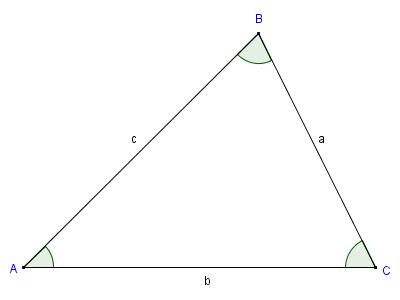 ## Median
- Each median divides the triangle into 2 smaller triangles of equal area
- The centroid is exactly $`\dfrac{2}{3}`$the way of each median from the vertex, or $`\dfrac{1}{3}`$ the way from the midpoint of the opposite side, or ```2:1``` ratio
- The three medians divide the triangle into ```6``` smaller triangles of equal area and ```3 pairs``` of congruent triangles
-
## Median
- Each median divides the triangle into 2 smaller triangles of equal area
- The centroid is exactly $`\dfrac{2}{3}`$the way of each median from the vertex, or $`\dfrac{1}{3}`$ the way from the midpoint of the opposite side, or ```2:1``` ratio
- The three medians divide the triangle into ```6``` smaller triangles of equal area and ```3 pairs``` of congruent triangles
-  ## Terms:
- ```Altitude``` The height of a triangle, a line segment through a vertex and perpendicular to the opposite side
- ```Orthocenter```: where all 3 altitudes of the triangle intersect
-
## Terms:
- ```Altitude``` The height of a triangle, a line segment through a vertex and perpendicular to the opposite side
- ```Orthocenter```: where all 3 altitudes of the triangle intersect
- 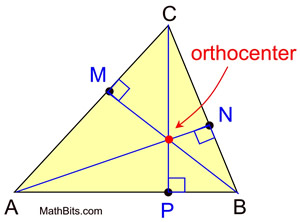 - ```Midpoint```: A point on a line where the length of either side of the point are equal
- ```Median```: A line segment joining the vertex to the midpoint of the opposite side
- ```Midsegment```: A line joining 2 midpoints of the 2 sides of a triangle
- ```Centroid```: The intersection of the 3 medians of a triangle
-
- ```Midpoint```: A point on a line where the length of either side of the point are equal
- ```Median```: A line segment joining the vertex to the midpoint of the opposite side
- ```Midsegment```: A line joining 2 midpoints of the 2 sides of a triangle
- ```Centroid```: The intersection of the 3 medians of a triangle
-  ## Proportionality theorem:
- The midsegment of a triangle is ```half``` the length of the opposite side and ```parallel``` to the opposite side
- Three midsegment of a triangle divide ```4 congruent``` triangles with the same area
- The Ratio of the outer triangle to the triangle created by the 3 midsegments is ```4 to 1```
-
## Proportionality theorem:
- The midsegment of a triangle is ```half``` the length of the opposite side and ```parallel``` to the opposite side
- Three midsegment of a triangle divide ```4 congruent``` triangles with the same area
- The Ratio of the outer triangle to the triangle created by the 3 midsegments is ```4 to 1```
-  ## Tips
- Make sure to know your optimization formualas
- Read the word problems carefully, determine which formual to use
- Never **ASSUME**, be sure to **CALCULATE** as most of the time the drawings are **NOT ACCURATE**
- To find ```missing area```, take what you have, subtract what you don't want
- Don't be afraid to draw lines to help you solve the problem
## Tips
- Make sure to know your optimization formualas
- Read the word problems carefully, determine which formual to use
- Never **ASSUME**, be sure to **CALCULATE** as most of the time the drawings are **NOT ACCURATE**
- To find ```missing area```, take what you have, subtract what you don't want
- Don't be afraid to draw lines to help you solve the problem
 2. ```Supplementary Angle Triangle``` (SAT)
- When two angles add up to 180 degrees
-
2. ```Supplementary Angle Triangle``` (SAT)
- When two angles add up to 180 degrees
-  3. ```Opposite Angle Theorem (OAT)``` (OAT)
- Two lines intersect, two angles form opposite. They have equal measures
-
3. ```Opposite Angle Theorem (OAT)``` (OAT)
- Two lines intersect, two angles form opposite. They have equal measures
-  4. ```Complementary Angle Theorem``` (CAT)
- The sum of two angles that add up to 90 degrees
-
4. ```Complementary Angle Theorem``` (CAT)
- The sum of two angles that add up to 90 degrees
-  5. ```Angle Sum of a Triangle Theorem``` (ASTT)
- The sum of the three interior angles of any triangle is 180 degrees
-
5. ```Angle Sum of a Triangle Theorem``` (ASTT)
- The sum of the three interior angles of any triangle is 180 degrees
-  6. ```Exterior Angle Theorem``` (EAT)
- The measure of an exterior angle is equal to the sum of the measures of the opposite interior angles
-
6. ```Exterior Angle Theorem``` (EAT)
- The measure of an exterior angle is equal to the sum of the measures of the opposite interior angles
- 7. ``` Isosceles Triangle Theorem``` (ITT)
- The base angles in any isosceles triangle are equal
-
7. ``` Isosceles Triangle Theorem``` (ITT)
- The base angles in any isosceles triangle are equal
-  8. ```Sum of The Interior Angle of a Polygon```
- The sum of the interioir angles of any polygon is ```180(n-2)``` or ```180n - 360```, where ```n``` is the number of sides of the polygon
-
8. ```Sum of The Interior Angle of a Polygon```
- The sum of the interioir angles of any polygon is ```180(n-2)``` or ```180n - 360```, where ```n``` is the number of sides of the polygon
-  9. ```Exterior Angles of a Convex Polygon```
- The sum of the exterior angle of any convex polygon is always ```360 degrees```
-
9. ```Exterior Angles of a Convex Polygon```
- The sum of the exterior angle of any convex polygon is always ```360 degrees```
-  ## Properties of Quadrilaterals
- Determine the shape using the properties of it
|Figure|Properties|
|:-----|:---------|
|Scalene Triangle|no sides equal|Length of line segment|
|Isosceles Triangle| two sides equal|Length of line segment|
|Equilateral Triangle|All sides equal|Length of line segment|
|Right Angle Triangle|Two sides are perpendicular to each other|
|Parallelogram|Opposite sides are parallel and have equal length. Additionally, the diagonals bisect each other|
|Rectangle|Adjacent sides are perpendicular to each other. Furthermore, the diagonals bisect each other and are equal in length|
|Square|All sides are equal in length. The adjacent sides and diagonals are perpendicular. The adjacent sides are equal in length, so as the diagonals|
|Rhombus|Opposite sides are parallel and all sides are equal to each other, the diagonals are perpendicular|
|Trapezoid|There is one pair of opposite sides and they are parallel and unequal in length|
|Kite|The diagonals are perpendicular|
## 2D Geometry Equations
|Shape|Formula|Picture|
|:----|:------|:------|
|Rectangle|```Area```: $`lw`$
## Properties of Quadrilaterals
- Determine the shape using the properties of it
|Figure|Properties|
|:-----|:---------|
|Scalene Triangle|no sides equal|Length of line segment|
|Isosceles Triangle| two sides equal|Length of line segment|
|Equilateral Triangle|All sides equal|Length of line segment|
|Right Angle Triangle|Two sides are perpendicular to each other|
|Parallelogram|Opposite sides are parallel and have equal length. Additionally, the diagonals bisect each other|
|Rectangle|Adjacent sides are perpendicular to each other. Furthermore, the diagonals bisect each other and are equal in length|
|Square|All sides are equal in length. The adjacent sides and diagonals are perpendicular. The adjacent sides are equal in length, so as the diagonals|
|Rhombus|Opposite sides are parallel and all sides are equal to each other, the diagonals are perpendicular|
|Trapezoid|There is one pair of opposite sides and they are parallel and unequal in length|
|Kite|The diagonals are perpendicular|
## 2D Geometry Equations
|Shape|Formula|Picture|
|:----|:------|:------|
|Rectangle|```Area```: $`lw`$  ## Median
- Each median divides the triangle into 2 smaller triangles of equal area
- The centroid is exactly $`\dfrac{2}{3}`$the way of each median from the vertex, or $`\dfrac{1}{3}`$ the way from the midpoint of the opposite side, or ```2:1``` ratio
- The three medians divide the triangle into ```6``` smaller triangles of equal area and ```3 pairs``` of congruent triangles
-
## Median
- Each median divides the triangle into 2 smaller triangles of equal area
- The centroid is exactly $`\dfrac{2}{3}`$the way of each median from the vertex, or $`\dfrac{1}{3}`$ the way from the midpoint of the opposite side, or ```2:1``` ratio
- The three medians divide the triangle into ```6``` smaller triangles of equal area and ```3 pairs``` of congruent triangles
-  ## Terms:
- ```Altitude``` The height of a triangle, a line segment through a vertex and perpendicular to the opposite side
- ```Orthocenter```: where all 3 altitudes of the triangle intersect
-
## Terms:
- ```Altitude``` The height of a triangle, a line segment through a vertex and perpendicular to the opposite side
- ```Orthocenter```: where all 3 altitudes of the triangle intersect
-  - ```Midpoint```: A point on a line where the length of either side of the point are equal
- ```Median```: A line segment joining the vertex to the midpoint of the opposite side
- ```Midsegment```: A line joining 2 midpoints of the 2 sides of a triangle
- ```Centroid```: The intersection of the 3 medians of a triangle
-
- ```Midpoint```: A point on a line where the length of either side of the point are equal
- ```Median```: A line segment joining the vertex to the midpoint of the opposite side
- ```Midsegment```: A line joining 2 midpoints of the 2 sides of a triangle
- ```Centroid```: The intersection of the 3 medians of a triangle
-  ## Proportionality theorem:
- The midsegment of a triangle is ```half``` the length of the opposite side and ```parallel``` to the opposite side
- Three midsegment of a triangle divide ```4 congruent``` triangles with the same area
- The Ratio of the outer triangle to the triangle created by the 3 midsegments is ```4 to 1```
-
## Proportionality theorem:
- The midsegment of a triangle is ```half``` the length of the opposite side and ```parallel``` to the opposite side
- Three midsegment of a triangle divide ```4 congruent``` triangles with the same area
- The Ratio of the outer triangle to the triangle created by the 3 midsegments is ```4 to 1```
-